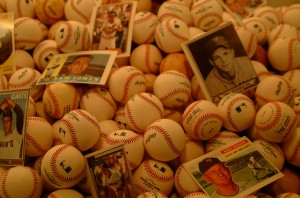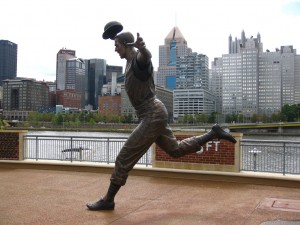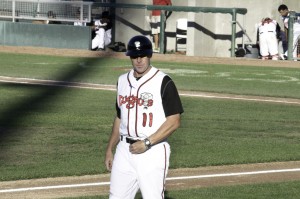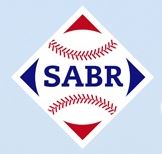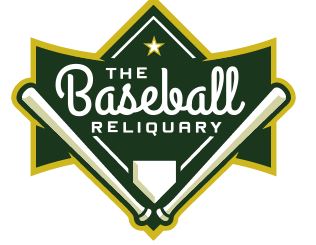My favorite World Series? 1960.
To understand why this is my favorite, it helps to set the stage.
The year was 1960. There were only 16 major league teams. If you didn’t finish with ‘the best record in your league, you didn’t go to the World Series. No one had ever heard of the designated hitter, the wild card, WAR or even WHIP. Home Run Derby was on TV – in black and white, with power hitters pairing off at Wrigley Field in Los Angeles.
Ted Williams finished his career with a home run in his last at bat and Brooks Robinson won his first Gold Glove. MLB held two All Star Games. The White Sox became the first team to put players’ names on uniforms. Warren Spahn threw his first no-hitter at age 39 (and won a league-leading 21 games) and Juan Marichal threw a one-hitter in his major league debut at age 22. Roger Maris won his first MVP Award in his first year as a Yankee (after being traded from the Kansas City Athletics). The Pirates’ Dick Groat won the NL batting title and MVP Award.
Mickey Mantle led the AL in home runs, Roger Maris in RBIs, Pete Runnels led the league in hitting, and Minnie Minoso collected the most hits. In the NL, Ernie Banks won the home run crown, Hank Aaron the RBI title and Willie Mays topped the senior circuit in hits. Don Drysdale and Sandy Koufax finished one-two in the NL strikeout race, while Jim Bunning topped the AL. Lindy McDaniel of the Cardinals set a new record with 26 saves, while the Tigers’ Frank Lary’s 15 complete games were the lowest ever to lead either league.
I was thirteen and an avid baseball fan. The Game of the Week (in black and white), the radio – especially the radio – and an occasional trip to the ball park were my tickets to the national past time.
At the time, the Yankees were baseball’s dynasty. Since my birth in 1947, the Bronx Bombers had been to 11 World Series (including the 1960 Series, yet to be played) and had won eight World Championships. Fans from pretty much everywhere but New York had made Yankee-hating a tradition. I was no exception. Milwaukee-born, I was a steadfast Braves fan, still smarting from the Yankees’ 1958 World Series comeback, when they downed my Braves after trailing three games to one. The Yankees were in the 1960 Series – and I had an emotional interest in seeing them lose.
Being of Polish descent, I also took pride in the fact the great Stan Musial was Polish and wondered why Milwaukee-born Hall of Famer Al Simmons had changed his name from Al Symanski. I was a fan of the sleeveless power hitter Ted Kluszewski, regretted that Tony Kubek (also of Polish descent) played for the Yankees, was rooting for the Pirates Bill Mazeroski, and wished that my heroes Eddie Mathews and Hank Aaron could boast of a little Polish ancestry. I also was firm in my belief that Steve Dalkowski threw that fastest fastball ever … you can look it up.
Put all of this together and you can see why I looked to the 1960 World Series with excitement – and why I was rooting for the underdog Pirates. The fact is, very few expected much of a Series and, instead, they got a great seesaw battle and a major upset.
The prognosticators predicted a Yankee win in five or six games. They pointed out that the Yankees, with a 97-57 record (the Pirates were 95-59-1) came into the Series with the momentum of a 15-game, season-closing winning streak, while the Pirates lost four of their final seven. They also lauded the Yankees’ post-season experience (in the decade of the 1950s, the Yankees played in eight World Series, winning six, while the Pirates hadn’t seen postseason play since 1927.) And, they heralded the Yankees power (the Yankees led the AL with a record 193 home runs and 746 runs scored, while the Pirates led the NL with 734 runs scored, but only 120 round trippers) – the Yankees’ game one starting lineup had belted 152 regular season homers to 98 for the Pirates’ starters. When it came to mound work, things appeared more balanced, maybe even a shade in favor of the Pirates. While the Yankees’ 3.52 ERA was the lowest in the AL, the Pirates’ NL third-best ERA (at 3.49) slightly bettered the Bomber mark. The Pirates did have the clear advantage in strikeouts (811-712) and fewest walks allowed (an NL low of 386 to an AL worst 609 for the Yankees). They also boasted the Cy Young Award winner in Vernon Law (20-9, 3.08), backed up by Bob Friend (18-12, 3.00), while no Yankee starter had topped 15 wins. The top relievers for the two teams were Elroy Face, with 24 saves for Pittsburgh and Bobby Shantz, who saved 11 for the Yanks.
When the Series was over, Pirate pitching made the difference, but you could never tell from the stats line:
- The Yankees scored a Series’ record 55 runs to 27 for the Pirates,
- The Yankees collected a Series’ record 91 hits to 60 for the Pirates.
- The Yankees hit a Series record .338 to .256 for the Pirates
- The Yankees collected a Series’ record 27 extra base hits to 15 for the Pirates.
- The Yankees out-homered the Pirates 10-4.
- The Yankees’ pitchers put up a 3.54 ERA to 7.11 for the Pirates.
- Bobby Richardson of the Yankees won the Series MVP award, hitting .367 with a Series’ record 12 RBI.
- The Yankees’ Whitey Ford was the Series’ most effective pitcher, throwing two complete game shutout in two starts.
Couple all of this with the fact that the Pirates won the series with a 10-9 victory in Game Seven – highlighted by a bottom of the ninth walk-off home run by Bill Mazeroski – and you can see why this is BBRT’s favorite World Series.
Let’s look at it, game by game.
Game One (October 5, at Pittsburgh)
The Yankees’ power made itself felt in the first inning, as right-fielder Roger Maris punctuated his first-ever World Series at bat with a towering upper deck home run off Pirate ace and 20-game winner Vernon Law. The Pirates woke up the home crowd by coming right back with three runs in the bottom of the inning off Yankee starter (15-game winner) Art Ditmar, a Casey Stengel choice that surprised fans and sportswriters alike (Whitey Ford was the presumed Game One choice.) Pirate center-fielder Bill Virdon led off with a walk, stole second and then went to third when nobody covered the base and Yogi Berra’s throw sailed into center field (error, shortstop Tony Kubek). Then, NL batting champ Dick Groat (shortstop) doubled home Virdon, left fielder Bob Skinner singled home Groat (and promptly stole second, as the Pirates had decided to try and counter the Yankees’ power with speed and aggressive base running). First baseman Dick Stuart lined out to right and right fielder Roberto Clemente singled in Skinner – sending Ditmar to an early shower. Jim Coates came in and got out of the inning with no more damage.
The Yanks seemed ready to bounce back in second, as Yogi Berra and first baseman Moose Skowron singled to open the inning. Then Stengel made a managerial move that some saw as early-game panic. He lifted (and embarrassed) starting third baseman Clete Boyer for pinch hitter Dale Long (who flied out to right). Next, second sacker Bobby Richardson lined out to left and Berra was double off second (Bob Skinner to Bill Mazeroski) – threat and game pretty much over.
As the game went on, Law pitched in and out of trouble, giving up ten hits and a walk, but only two runs over seven innings. The Yanks did scratch out a run in the top of the fourth (Maris scoring on a Skowron single), but the Pirates bounced right back with a two-run homer over the left field scoreboard by Mazeroski. The Pirate second baseman scored another run in the bottom of the sixth (on a Bill Virdon double), and the 6-2 lead held until the top of the ninth, when the Yankees got a two-run pinch-hit homer from Elston Howard. FINAL: Pirates 6 – Yankees 4
Game 2 (October 2, at Pittsburgh)
The Pittsburgh “high” from Game One was matched – and then some – by the “low” of Game Two, which opened with 18-game winner Bob Friend on the mound for the Pirates and nine-game winner Bob Turley hurling for the Yankees. Given the match up and the first game results, hopes were high at Forbes Field. The Pirates, however, were without starting left fielder (and perhaps their best left-handed hitter) Bob Skinner, who had injured his left hand in game one. Pirate Manager Danny Murtaugh put right-handed hitting Geno Cimoli in left and, in an effort to add a left-handed bat, benched the Pirates’ leading home run hitter, first baseman Dick Stuart, in favor of Rocky Nelson. The line-up changes were pretty much forgotten by the end of the game.
The Yanks scored first, with two runs in the top of the third and one in the top of the fourth, with the Pirates getting one back in the bottom of the fourth to make it 3-1 Yanks. Then the roof fell in. Murtaugh had pinch-hit for Friend in the fourth, so Freddie Green took the mound for the Pirates in the fifth. The hard-throwing lefty walked the first batter he faced (shortstop Gil McDougald) and got right fielder Roger Maris to hit into a fielder’s choice before center fielder Mickey Mantle crushed a two-run homer to right-center. The Yankees added seven runs off three Pirate hurlers in the sixth in an inning that went: Elston Howard – triple; Bobby Richardson – run-scoring double; Bob Turley – ground out to pitcher; Tony Kubek safe on an error; Gil McDougald – run-scoring single; Roger Maris – walk; Mickey Mantle – strikeout; Yogi Berra – two-run single; Moose Skowron – run-scoring single; Elston Howard – run-scoring single; Bobby Richardson – run-scoring single; Bob Turley – fly out (his second out of the inning). It was quiet in Pittsburgh and got even quieter in the top of the seventh when Mantle made up for his sixth-inning strikeout with a 475-foot, three-run homer to right-center. The Yanks added a meaningless tally in the top of the ninth, while the Pirates put up two runs in the bottom of the inning, finally getting to Turley. Overall, the Yankees collected 19 hits and five walks off six Pittsburgh hurlers, while Turley managed to scatter 13 hits and three walks, giving up just three runs (two earned) in 8 1/3 innings (with Bobby Shantz getting the last two outs).
FINAL: Yankees 16 – Pirates 3
Game Three ( October 3, at New York)
If the Pirates were shell-shocked in Game Two, they got no relief in Game Three. After the Bucs went down quietly against Whitey Ford (12-9 in the regular season), Pirates’ starter Vinegar Bend Mizell (13-5) lasted only 1/3 of an inning, as the Yankees posted six runs in the bottom of the first, highlighted by a grand slam off the bat of Bobby Richardson, who had hit only one home run all season. The only other Yankee scoring came in the four-run fourth, which included Mantle’s third homer of the series (a two-run shot) and a two-run single for Richardson, giving him Series’ record six RBI in the game. Overall, the Yankees picked up 16 hits and four walks off six Pirate pitchers – while Ford threw a complete-game, four-hit, shutout. The prognosticators saw all as once again right with the baseball world and the Yankee juggernaut. Clouds, however, loomed on the horizon.
FINAL: Yankees 10 – Pirates 0
Game Four (October 4, at New York)
Game Four featured Pirates’ Ace Vernon Law (winner of Game One) against Ralph Terry, who had gone 10-8 for the Yankees. Another Bomber rout seemed possible as Terry started the game with a one-two-three first, including strikeouts of center fielder Bill Virdon and right fielder Roberto Clemente. The Yankees opened the bottom of the first with a single by left fielder Bob Cerv and a double by shortstop Tony Kubek. Runners on second and third, no outs and the big three of Roger Maris, Mickey Mantle and Yogi Berra slated to hit. Law, however, got Maris on a fly out to short right, intentionally walked Mantle and got the usually clutch-hitting Berra to hit into a double play. The Pirates had new life – and new spirit.
The Yankee power did emerge in the fourth, as the Bombers took a one-run lead on first baseman Moose Skowron’s homer to right. The Pirates, however, came back with three in the top of the fifth as left fielder Geno Cimoli led off with a single; catcher Smoky Burgess was safe at first as Skowron threw too late to second trying for a force of Cimoli; third baseman Don Hoak popped out on an attempted sacrifice; second baseman Bill Mazeroski popped out to first; Law doubled in Cimoli; center fielder Bill Virdon singled home Burgess and Law; and shortstop Dick Groat popped out. The three runs were all Law would need, as the Yankees managed only one more run off Law and reliever Elroy Face.
Final: Pirates 3 – Yankees 2 … GAME ON!
Game 5 (October 10, at New York)
The experts already considered this an upset, the Pirates had guaranteed at least a six-game series. Now Stengel, already criticized for not using World Series-seasoned Whitey Ford in Game One – enabling Game One, Four and Seven starts for the “Chairman of the Board” – faced another decision. Should he stick with his original rotation and start Ditmar, who failed to make it out of the first inning in Game One? Or go with impressive rookie Bill Stafford, who had gone 3-1 with a 2.25 in 11 games? Stengel stuck with Ditmar, who faced off against 11-game winner Harvey Haddix (most famous for his record 12 2/3 perfect innings against the powerful Milwaukee Braves in a May 1959 loss).
Ditmar improved on his Game One performance, but only slightly, lasting 1 1/3 innings this time – as the Pirates pushed across three runs in the top of the second. It was all they would need as the Yankees scored only two runs (one in the second on a Tony Kubek ground out and another in the third on a towering homer into the right field upper deck by Roger Maris). The Pirates scored one in the top of the third (on a double by Dick Groat and an RBI-single by Roberto Clemente and added an insurance run in the top of the ninth – a Don Hoak single plating Smoky Burgess. Then it was back to Pittsburgh with the underdog Pirates leading three games to two. Bill Stafford, by the way, tossed 5 scoreless innings (3 hits) in relief, resulting in even more criticism of Stengel’s pitching choices.
FINAL: Pirates 5 – Yankees 2
Game 6 (October 12, at Pittsburgh)
Game Six created more pitching problems for Stengel, who it was reported had hoped to go into the game with a one-game lead and toss Bob Turley, saving Whitey Ford for a Game Seven if necessary. Facing elimination, however, Stengel handed the ball to Ford (on only three days rest). Opposing Ford would be well-rested Bob Friend, the Game Two loser.
After Friend tossed a 1-2-3 first, Ford gave up a lead-off single to Bill Virdon, who was quickly erased on a double play. Clemente followed with a sharp single to right, and a nervous Stengel got Bob Turley up in the bull pen. Ford, however, struck out first baseman/cleanup hitter Dick Stuart to end the inning.
As Ford set the Pirates down with just one hit in the second and third, the Yankee hitters went to work. They scored one in the top of the second, as a Ford infield single plated Yogi Berra (who beat the throw to the plate) and added five runs in the top of the third, when they batched five hits and a hit batsman (highlighted by Bobby Richardson’s two-run triple off the left-field scoreboard, which gave the Yankee second baseman a World Series’ record 11 RBI).
The Bronx Bombers added two more runs in the sixth, seventh and eighth innings, as they opened a commanding lead. Richardson was again at the center of the action, hitting his second triple of the game in the seventh (scoring catcher Johnny Blanchard and extending Richardson’s new RBI record).
Ford, meanwhile, was masterful – despite developing a blister on his pitching hand in the fifth inning. He pitched his second complete-game shutout, allowing only seven singles and one walk, while striking out five. The Yanks tallied 12 runs, on 17 hits off six Pittsburgh hurlers. With Ford’s second shutout came the outcry of second-guessers – who were now even more dissatisfied with Stengel’s pitching choices. The Pirates would now get a third start out of ace Vernon Law, while Ford was on the bench with two shutouts. Not surprisingly, the upcoming 1960 World Series Game Seven would be Stengel’s final contest as Yankee manager.
Final: Yankees 12 – Pirates 0
Game 7 (October 13, at Pittsburgh)
Despite being outscored 46 to 17, out hit 78 to 49 and out homered 8 to 1 in the first six games, the Pirates were looking forward to a Game Seven and a chance to win the Series at home behind Vernon Law (winner of Games One and Four.) The Yankees countered with Bob Turley, who, despite winning Game Two, had given up 13 hits and three walks in 8 1/3 innings. The Pirates also had their top left-handed hitter, Bob Skinner (injured in Game One), back at the number-three spot in the order, while the Yankees were missing Elston Howard (broken finger, Game Six).
This was the game that made took this World Series from good to great, so BBRT will look at it in more detail.
The Yanks went meekly in the top of the first inning (liner, popup, foul out), and the Pirates, homerless since Mazeroski’s blast in Game One, got a two-run homer from Rocky Nelson (whom Murtaugh chose to start at first base over regular Dick Stuart).
In second, Law set the heart of the Yankees down in order – Mantle, fly to center; Berra, grounder to third; Skowron, grounder to short. In the bottom of the inning, Stengel appeared to put his managerial position in further jeopardy. Smoky Burgess started the inning with a single and Stengel immediately pulled Turley in favor of the rookie Bill Stafford (who had stifled the Pirates for five innings in Game Five). The move did not pay off. Stafford walked third baseman Don Hoak and Mazeroski beat out a bunt single. Law was now at the plate (the Pirates’s pitcher was two for four, with a double, run scored and RBI in Games One and Four). Law hit back to Stafford for a pitcher-to home-to first double play, but center-fielder/lead-off hitter Bill Virdon followed with a two-run single and a 4-0 Pirates lead.
Law handcuffed the Yankees through four innings, giving up only two singles. In the fifth, Yankee first sacker Moose Skowron made the score 3-1 with a lead-off homer just inside the right field foul pole. Law did not let the roundtripper upset him, retiring Johnny Blanchard, Clete Boyer and Bobby Shantz (who came on to pitch for New York in the third) in order.
The Yankees closed the gap – and then some – in the top of the sixth. The pesky Bobby Richardson (who already had nine hits in the series) led off with a single to center, and Tony Kubek followed with a walk. With the Bombers appearing on the verge of a rally, Murtaugh replaced Law (who, it turns out had been pitching on a sore ankle throughout the Series) with his top reliever Elroy Face. Face got Roger Maris on a foul pop to Don Hoak at third base, but Mickey Mantle followed with a “seeing eye” single up the middle, scoring Richardson. Yogi Berra followed with a upper deck home run (like Skowron’s just inside the right field foul pole) to give New York a 5-4 lead in what was shaping up to be a Game Seven nail biter.
The veteran Bobby Shantz, meanwhile, was baffling the Pirates – giving up only a single and a walk from the third to the seventh innings.
In the top of the eighth, the Yankees seemed to dash the Pirates’ hopes – using a walk, two singles and a double to produce two more runs and a 7-4 lead. Notably, Stengel’s pitching decisions again came into play. He let Shantz bat with two out and runners at second and third (Boyer and Skowron) and a chance to extend the Yankee lead. Shantz flied out and the living-room and press-box managers were quick to point out: 1) the lost scoring opportunity; 2) the fact that Stengel left Shantz in for a sixth inning of work, despite the fact that Shantz had not gone more than four innings in the regular season.
So, that was the situation as the game went into the bottom of the eighth – when the Pirates (and Forbes Field) proved they still has some life left in them. Gino Cimoli pinch hit for Face and stroked a single to right-center field. Shantz, who had already induced two double plays appeared to have worked his magic again, as Bill Virdon hit a hard ground ball right at shortstop Tony Kubek. Just as Kubek was ready to field the ball and begin the sure double play, it appeared to hit a pebble (the Yankees had already been critical of the condition of the Forbes Field infield) and ricocheted into Kubek’s throat. Kubek went down, gasping for air and spitting up blood, with his windpipe rapidly swelling (doctors on the scene at first thought an emergency tracheotomy might be necessary). The end result? Kubek sent to the hospital and replaced by Joe DeMaestri and the Pirates with two on and no outs, instead of none on and two outs.
Pirates’ shortstop Dick Groat took advantage of Kubek’s mishap and lined singled to left, scoring Cimoli. Stengel came to the mound and replaced Shantz with right-hander Jim Coates (despite the fact that lefty Bill Skinner was coming to the plate). The righty-lefty matchup made little difference, as Skinner sacrificed the runners up one base. Next was Rocky Nelson, who flied out to medium right, with the Pirates choosing not to test Roger Maris’ arm. So, two outs, two on and the Yankees still in front 7-5. That brought up the Pirates’ best hitter, right-fielder Roberto Clemente, who had been held hitless in his first three at-bats. Coates made a good pitch, getting Clemente to hit a weak ground ball toward first. A hustling Clemente beat both Coates and Skowron’s throw to the bag, while Virdon scored and Groat moved to third. Now, 7-6 and the Pirates still had life.
That brought up backup catcher Hall Smith (who had come into the game in the eighth after Joe Christopher ran for starting catcher Smoky Burgess in the bottom of the seventh). Smith took a 2-2 Coates’ pitch over the left-field wall for a 9-7 Pittsburgh lead. The Pirates, with only one roundtripper in the first six games had homered twice for five runs in Game Seven.
To protect the lead in the ninth (and with Elroy Face already out of the game), Pirate Manager Danny Murtaugh called on starter Bob Friend, who had lost Games Two and Six, giving up seven earned runs in six innings (and had pitched in relief only once all season). Yankee lead off hitter Bobby Richardson started off the ninth with a single to left. Veteran and former-Pirate Dale Long, pinch hitting for Joe DeMaestri (who had replaced the injured Kubek) singled to right and Friend was gone, replaced by Game Five starter Harvey Haddix. Haddix got Roger Maris on a foul out, but Mickey Mantle drove in Richardson with a single to right center. Yogi Berra followed with a ground ball down the first base line. Rocky Nelson made a nice backhanded stop, but was out of position for a first-to second-to first, game-ending double play. Nelson took the sure out, stepping on the first base bag and retiring Berra, while Gil McDougald (pinch running for Long) headed toward home. It was at this point that Nelson realized Mantle had not run to second. Mantle, sizing up the situation, was returning to first (with the force at second now off). It was an unorthodox base-running move, but as Mantle dove head first back to the bag (avoiding Nelson’s desperate attempt to tag him), McDougald scored the tying run. Skowron then grounded out to Mazeroski (forcing Mantle) to end the inning in a 9-9 tie.
Stengel, like Murtaugh, was now using starters in relief, bringing Game Four-loser Ralph Terry in to pitch the ninth. Number-eight hitter Bill Mazeroski led off the inning. Terry’s first pitch was a high and inside fastball. The second pitch, another fastball, was in the strike zone and Mazeroski deposited it over the 406-foot marker in left center. Not sure the ball would carry out in the deep part of the park, Mazeroski ran full speed with his head down to first and toward second, before seeing the umpire making the circular home run signal. Mazeroski removed his helmet, waving his way to home plate where his team mates awaited the first player in major league history to end the World Series with a walk-off home run.
Trivia Tidbit: The seventh game of the 1960 Series is the only World Series game in which neither team recorded a strikeout.
FINAL: Pirates 10 – Yankees 9; Pirates 4 games – Yankees 3 Games; MLB and its 1960 fans, the ultimate winners in BBRT’s favorite World Series.
